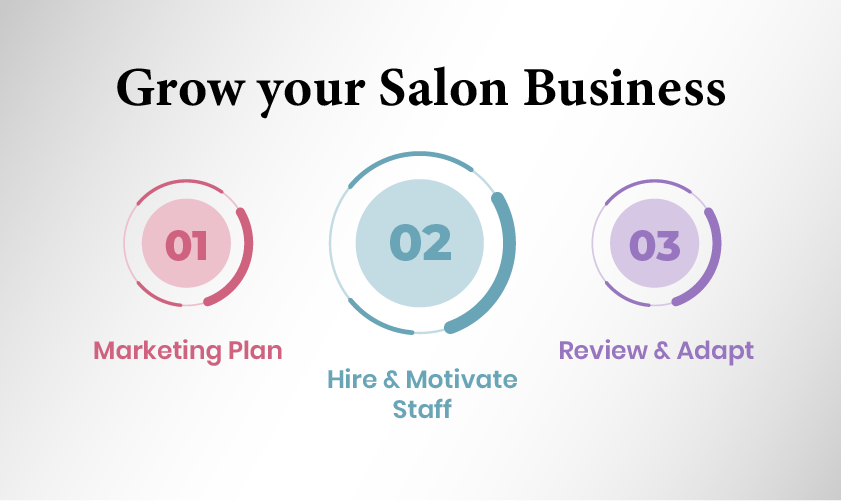Detailed guide: How to start a new salon business?

According to various sources, the salon industry is predicted to grow in the future despite the impact of the COVID-19 pandemic and economic issues around the globe. The following statistics are evident on the expansion of the salon industry in the future;
- According to Gitnux Marketdata Report 2023, the global salon services market is forecasted to grow from $215.65 billion in 2022 to $355.45 billion till 2029.
- According to Trafft’s report, the hair salon market is anticipated to have a steady 3.03% compound annual growth rate (CAGR) during 2023-2027.
- According to Future Market Insight’s service market snapshot 2023-20233, the salon services market was valued at US$233.8 billion, and from 2023 to 2033, the industry is set to grow at a 7.46 percent CAGR.
- Mckinsey’s report also explains that the salon market is anticipated to be distinguished by “premiumization,” with the exceptional beauty tier projected to rise at an annual rate of 8%.
The numbers may vary, but all of them show that the salon industry is going to grow rapidly in the coming years.
Excited to start a salon business?
Starting a business venture like a salon is an exciting thing. However, it demands a lot. You must be apt on everything from planning to execution. Therefore, to help you understand how to start a salon business, here is a comprehensive yet brief guide expressing various steps of the process.
Getting ready for your salon business
Starting a salon business requires careful preparation and understanding of the beauty industry. Each step in this phase is crucial to setting the foundation for your salon’s success.
Learn the basics
Before you dive into starting your salon business, constructing a strong foundation of understanding and skills is important. Learning the basics of salon management, customer service, and various beauty services is crucial. This can be accomplished via formal education, attending training sessions, or earning hands-on experience. Thus, consider enrolling in cosmetology or business courses that cover salon-specific topics, such as hairdressing techniques, skincare, and business management.
Find a mentor
Finding a mentor in the salon industry can be extremely beneficial. A mentor is somebody with knowledge and expertise who can direct you through the challenges and sophistication of the business. They can offer direction on everything from setting up your salon to handling client relationships and promotional strategies. Therefore, seek out a mentor through industry associations, networking events, or even within your local community. Furthermore, learning from somebody who has been in your shoes can save you time and help you avoid common pitfalls.
Define your vision
To succeed in the salon business, you need a clear vision of what success means to you. Hence, your vision should encompass your salon’s values, goals, and the experience you want to deliver to your clients. Therefore, consider questions like:
- What type of salon do you want to run?
- What services will you offer?
- How will you make your salon stand out?
A well-defined vision will serve as your compass, leading your decisions and actions as you build and grow your business.
Choose your salon type
The type of salon you choose to open is a critical decision. You can opt for a hair salon, a beauty salon, a home-based salon, a mobile salon, or even a salon suite. Each type has its advantages and challenges.
For instance, a hair salon may require a larger space and more equipment, while a home-based salon offers lower overhead costs. Your choice should be aligned with your expertise, resources, and target customers. Consider the local market demand and your personal choices at the time of making this decision.
Understand your clients
Comprehending your target audience is key to a thriving salon business. Identify who your ideal clients are, including their demographics, preferences, and needs. Tailoring your services and marketing efforts to cater to your target clients will increase your chances of attracting and retaining customers.
Conduct market research and surveys and engage with probable clients to acquire insights into their anticipations. Establishing strong relationships with your clients and meeting their needs will be essential for your salon’s long-term success.
Research your competition
Before opening your salon, it’s essential to be aware of your competition in the local area. Research other salons, spas, and beauty businesses to understand their strengths and weaknesses. Identify openings in the market that your salon can fill, and evaluate how you can distinguish yourself.
Your research can help you refine your business strategies, set competitive prices, and devise a unique selling proposition (USP) that will entice customers.
Planning your salon business

Nothing goes right when you start it without any plan and strategy. Starting a salon business also requires comprehensive planning.
Create a simple plan
Creating a business plan is critical in setting up your salon business. While the guide suggests a one-page business plan, it should include essential elements such as your salon’s mission, vision, target market, services offered, pricing strategy, marketing plan, budget, and financial projections. A business plan provides a roadmap for your salon’s growth and helps you stay organized and focused on your goals. It also serves as a useful tool when seeking financing or investors.
Set a budget
Budgeting is vital for managing your salon’s finances effectively. Determine how much money you can invest in your salon and allocate it wisely to cover startup costs like equipment, rent, supplies, and marketing expenses. Be practical about your budget and leave room for unexpected expenses. Trailing your expenses and sticking to your budget will enable you to avoid financial stress as you start and operate your salon business.
Get financing
Securing the necessary funds to start your salon may involve seeking loans, grants, or financial support from investors or family. Reckon your financing prospects and select the one that aligns with your financial circumstances and business goals. Be prepared to demonstrate your business plan and financial forecasts to potential lenders or investors to display your salon’s viability and possibility for profitability.
Choose your business’s legal structure
Deciding on the legal structure of your salon is an important step in establishing your business. You can choose to work as a sole proprietorship or start a limited liability company (LLC), among other options. Your business structure will influence your taxes, personal liability, and business regulations. Confer with legal and financial professionals to determine the best structure for your salon and ensure compliance with local laws and regulations.
Name your salon
Choosing a name for your salon is not just about branding; it’s also about making a memorable first impression on potential clients. Choose a name that echoes the essence of your salon and resounds with your target audience. Ensure that the name is unique, open for registration, and doesn’t violate any trademarks. A well-thought-out salon name can contribute to your brand’s identity and recognition in the market.
Register your business
You must register your salon business with the relevant authorities to operate lawfully. This process may involve obtaining a business license, registering your business name, and complying with local, state, and federal regulations. Proper registration not only ensures that your salon operates within the law but also helps build trust with clients and suppliers.
Get licenses and permits
In the beauty industry, acquiring the essential licenses and permits is necessary. Warrant that you comply with health and safety regulations and secure the required licenses for your specific services, such as cosmetology or esthetics licenses. Failure to acquire the essential permits can result in legal matters and endanger your salon’s reputation.
- Setting up your salon location
Matters like business locality and accessibility cannot be ignored while setting up a salon. Therefore, you must be ensuring the following aspects to warrant the best location for your business.
Find the right place
Choosing the right site for your salon is a strategic decision. Contemplate aspects like foot traffic, accessibility, immediacy to your target market, and local competition. A perfect location can tempt more customers and contribute to your salon’s success. Visit potential locations, assess their suitability, and intercede lease conditions that meet with your budget and business goals.
Get insurance
Protecting your salon and assets is a must. Invest in insurance coverage that includes general liability, possessions, and workers’ payment insurance if you have staff. Insurance provides financial protection in case of mishaps, property damage, or legal claims. Consult an insurance professional to tailor a policy that meets your salon’s needs.
Design the layout
The interior layout of your salon plays a crucial role in creating a welcoming and efficient space for both clients and staff. Plan the structure to maximize the use of the available space, assure proper flow, and create a comfortable atmosphere. Consider factors like the placement of workstations, waiting areas, and treatment rooms. Your salon’s layout should promote a positive client experience and efficient service delivery.
Buy equipment
Equipping your salon with the right gadgets and equipment is necessary for providing the best quality services. Invest in high-quality styling chairs, hairdryers, shampoo stations, skincare equipment, and nail stations. Quality equipment not only improves your services but also plays a role in building your salon’s professional image.
Create your salon brand and offers

Your salon’s brand and services are what set you apart from the competition.
Design a logo
A logo is a visual manifestation of your salon’s brand. Design a distinctive and indelible logo that echoes your salon’s identity. It should be quickly recognizable and adaptable enough to be used on signage, marketing materials, and your website.
Visual identity
Consistency in your salon’s visual identity is crucial for brand distinction. Choose a color palette, fonts, and design elements that resonate with your brand’s personality. Ensure that these elements are consistently used in your salon’s interior decor, marketing materials, and online presence.
Service menu
Your service menu is your catalog of offerings to clients. Craft a well-organized menu that clearly lists all the services you provide, including descriptions and prices. Make sure it’s visually attractive and easy for clients to understand. Highlight any special packages or promotions to encourage clients to try a variety of services.
Retail products
Retail products, such as haircare, skincare, or nail products, can be another source of income for your salon. Select high-quality products that complement your services. Educate your staff on these products to effectively recommend them to clients, increasing sales and customer satisfaction.
Salon business support
To operate efficiently, you need the right support systems in place.
Use salon software
Salon management software simplifies various aspects of your business, including appointment scheduling, inventory management, and financial tracking. Invest in a reliable software solution that streamlines salon operations, allowing you to focus on serving clients and growing your business.
Online presence
Establishing an online presence is vital in today’s digital age. Register a domain name that fits your salon’s name and develop professional email addresses. This not only lends credibility to your business but also makes it more uncomplicated for clients to reach you.
Create a website
A well-designed website is your online storefront. It should provide essential information about your salon, including services, prices, staff profiles, and contact details. Make sure that your website is user-friendly and meets the requirements of search engines to attract potential clients.
Social media
Social media outlets are effective tools for marketing your salon. Create profiles on platforms like Instagram, Facebook, and Twitter. Develop a content plan to engage with your audience, exhibit your work, and advertise special offers. Consistency and interaction with your followers can help you build a solid online presence.
Marketing materials
Design professional business cards, stationery, and marketing materials that align with your salon’s brand. These materials should effectively convey your salon’s identity and contact information. Distribute business cards to clients and local businesses to increase your salon’s visibility.
Growing your salon business

With your salon established, focus on growth strategies to expand your client base and business success.
Marketing plan
Devise a comprehensive marketing program outlining strategies to attract and retain new clients. Consider advertising, social media marketing, email campaigns, and promotions to increase your salon’s visibility and customer base.
Hire and motivate staff
As your salon grows, you may ought to hire more staff members. Ensure that you select team members who align with your salon’s culture and values. Therefore, create a motivating and supportive work environment to retain skilled staff.
Review and adapt
Business is dynamic, and it’s important to adjust to changing circumstances. Periodically review your salon business plan, services, and marketing strategies. Also, use feedback from clients and staff to make improvements and drive continuous growth.
Conclusion
Starting and running a salon business is a compelling journey that entangles careful planning and attention to detail. Following these phases will help you build a strong foundation for your salon’s success while serving the needs of your clients and community effectively.